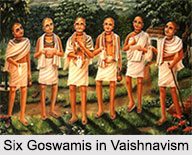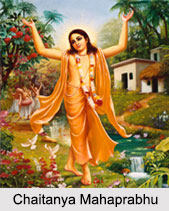 Six Goswamis in Vaishnavism were a group of scholarly and ascetic devotees of Lord Krishna. The Six Goswamis lived in India during the 15th and 16th Century. They were the leading disciples of Chaitanya Mahaprabhu. They were also known as "Sada Goswami".
Six Goswamis in Vaishnavism were a group of scholarly and ascetic devotees of Lord Krishna. The Six Goswamis lived in India during the 15th and 16th Century. They were the leading disciples of Chaitanya Mahaprabhu. They were also known as "Sada Goswami".
Contributions of Six Goswamis in Vaishnavism
The Six Goswamis are associated with the land of Vrindavan as they had spent much time in service of the Chaitanya Mahaprabhu. They are highly regarded, as they had renounced physical comforts and pleasures in the practice of Bhakti Yoga. They were adept in Sanskrit. They contributed to the foundation of Gaudiya Vaishnavism. They had produced several writings based on philosophies of Vaishnavism and practices. Under Chaitanya Mahaprabhu"s direction, they showed that the essence of all Vedic teachings is devotional service to God, Bhakti Yoga. Their work largely forms the scriptural and philosophical basis of ISKCON, popularly known as the "Hare Krishna Movement".
They also dedicated a significant amount of their time to supposedly ancient and sacred areas of land in Vrindavan that are associated with Radha, Lord Krishna and the Gopis. The Goswamis managed to inspire the building of a number of large temples around these sites that are dedicated to the worship of Radha and Lord Krishna.
 Six Goswamis in Vaishnavism
Six Goswamis in Vaishnavism
The six Goswamis are: Rupa Goswami and Sanatana Goswami, Raghunatha Bhatta Goswami, Jiva Goswami, Gopala Bhatta Goswami and Raghunatha Dasa Goswami.
Rupa Goswami: He was an Indian devotional teacher who belonged to the Gaudiya Vaishnava tradition of Hinduism. He was considered as the leader of the Six Goswamis of Vrindavan associated with Chaitanya Mahaprabhu.
Sanatana Goswami: He was a principal disciple of Chaitanya. He wrote several works in the Bhakti tradition. He was the senior most of the influential Six Goswamis of Vrindavan.
Raghunatha Bhatta Goswami: He was a disciple of the Vaishnava saint Chaitanya Mahaprabhu. He was also the member of the influential Gaudiya Vaishnava group. He is regarded as an ideal practitioner of the Bhakti yoga system.
Jiva Goswami: Jiva Goswami is one of the most prolific and important philosopher from the Gaudiya Vaishnava school of Vedanta tradition. He produced several philosophical works on the theology and practice of Bhakti yoga, Vaishnava Vedanta and associated disciplines. He was the nephew of Rupa Goswami and Sanatana Goswami.
Gopala Bhatta Goswami: He is one of the foremost disciples of the Vaishnava saint, Chaitanya as well as a leading historical figure in the Gaudiya Vaishnavism. He was also influential in establishing the philosophical basis of the Gaudiya tradition.
Raghunatha Dasa Goswami: He was also known as "Dasa Goswami". He was one of the principal disciples of the Chaitanya Mahaprabhu. Along with others he was also responsible in establishing the philosophical writings and records which became the theological basis of the Gaudiya Vaishnava tradition. He was known for his qualities of simplicity and renunciation.









